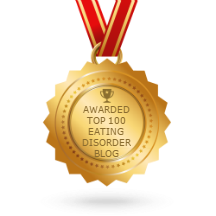- Home
- About
-
Services
- Therapy
-
Eating Disorder Trainings
>
- Clinical Approaches To Treating Body Image Issues
- Clinical Approaches To Treating Bulimia & Binge Eating Disorder
- Finding Freedom From Binge Eating
- Finding Freedom From Anorexia
- Supporting A Loved One With An Eating Disorder
- Eating Disorder Recovery Road Map
- Healing From Body Hate And Practicing Self-Compassion
- Common Questions
- Blog
- Press
- Contact
|
Binge eating disorder is the most common eating disorder in the U.S., however it is often highly misunderstood and stigmatized. Additionally, many people who are struggling do not seek treatment due to shame, guilt, and denial of the severity of the illness. As a psychotherapist and recovery coach who is passionate about helping people in their recovery from binge eating disorder, the following are three tips for your recovery. 1. Seek professional help from a multidisciplinary team. If you are struggling with binge eating disorder, it is so important to seek help from a team of trained professionals. Eating disorders are life-threatening, complex illnesses, and having the support of a multidisciplinary team is crucial. That team could include a therapist, registered dietitian, psychiatrist, and a recovery coach (depending on your specific needs). It is important to look for professionals who specialize in treating binge eating disorder and who work from a health at every size and weight neutral perspective. Seeking help when you are struggling is a sign of true strength, not weakness. 2. Work to make peace with your binging and uncover the function of the behavior. Clients that I’ve worked with who are struggling with binge eating disorder often report feeling a sense of shame, embarrassment and guilt, surrounding their binging. Thus, I often begin by explaining that binging is often a natural and adaptive bodily response to real or perceived deprivation. Our bodies evolved to ensure our survival as a species and it makes sense that physical and/or emotional restriction can trigger subsequent binging episodes. Physical restriction is the idea of depriving yourself of certain foods, whereas emotional restriction is eating a food while experiencing a sense of guilt or shame. Additionally, binging is helping you to get some very valid needs met. Binging behaviors may be a way that you are coping with past trauma, unpleasant emotions or a history of food insecurity. Therefore, my aim is to help clients to uncover the function of their binging, practice self-compassion, and gradually work to utilize more life-affirming coping strategies. It’s important to practice self-compassion and to explore your binging behavior from a place of curiosity and nonjudgment. “Beating yourself up” for binging will likely only serve to perpetuate the behavior and cause you to feel even worse. 3. Educate yourself on the principles of health at every size and intuitive eating. Health at every size is a movement, which supports people of all sizes in finding compassionate ways to take care of themselves.[i] Many of my clients with eating disorders struggle with body-image issues. Educating yourself on health at every size and body positivity is one way to begin to unlearn the harmful messaging that we receive through diet-culture. Intuitive eating is often not recommended for those in early recovery, however when someone is further along in their recovery, it can be life-changing. Intuitive eating integrates mindfulness to one’s hunger and fullness cues, getting rid of a focus on weight, letting go of food rules, and neutralizing all foods. If you are not familiar with it, I would highly recommend checking out the book “Intuitive Eating” by Evelyn Tribole and Elyse Resch. Additionally, one of my favorite books to recommend to my clients in their recovery from binge eating disorder is “The Diet Survivor’s Handbook” by Judith Matz and Ellyn Frankel. The Bottom Line I’ve watched my clients make amazing changes in their lives and discover a newfound sense of empowerment and freedom. You don’t have to continue to struggle with constant food thoughts, body shame, or feelings of guilt after eating. Full recovery from binge eating disorder is possible. With access to proper treatment and support, you can recover and go on to lead a productive and meaningful life. Jennifer Rollin, MSW, LCSW-C: has a private practice providing therapy in Rockville, Maryland, for adolescents and adults struggling with eating disorders, body image issues, anxiety, and survivors of trauma. Jennifer offers eating disorder recovery coaching via phone/Skype. Connect with Jennifer through her website at www.jenniferrollin.com [i] http://haescommunity.com/
4 Comments
Thank you for posting this, it is the exact reminder I needed after a weekend visiting family, which often brings back some of my binge eating behaviors. While I consider myself miles ahead of where I was a few years ago, I have to remind myself that getting better is a journey, and that all journey's have good and not-so-good moments. Beating myself up will not change anything from the past 48 hours.
Reply
Jennifer Rollin, MSW, LCSW-C
1/2/2017 05:51:08 am
Hi Elizabeth,
Reply
4/27/2023 04:50:36 pm
For the past couple of weeks, I've been eating a lot more than my body, and I'm very embarrassed about it. I'm glad you talked about how we need to practice self-compassion to help us deal with our issues, so I think it's time that I find a therapist to help me. Thank you for the advice on recovering from a binge eating disorder.
Reply
Leave a Reply. |
About MeI'm an eating disorder therapist in private practice in Rockville, MD. Archives
June 2024
|


 RSS Feed
RSS Feed
